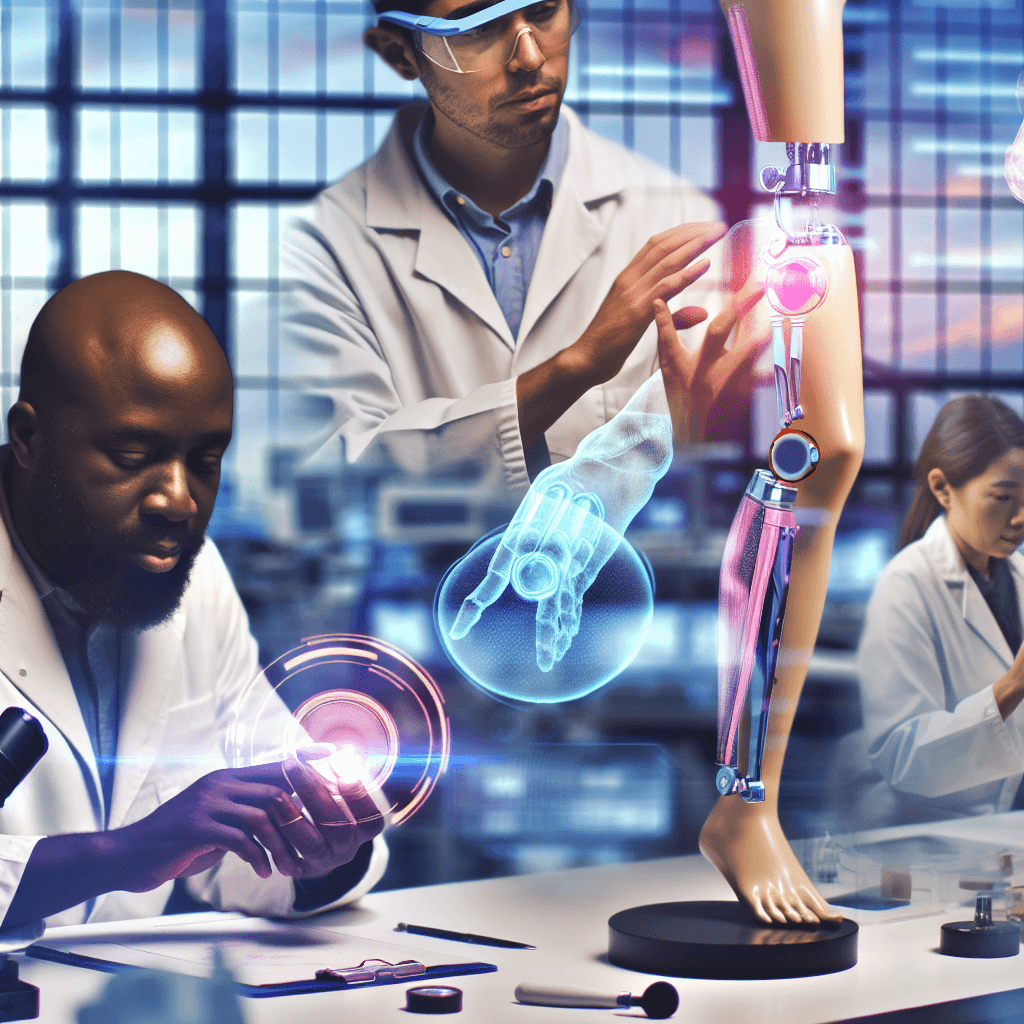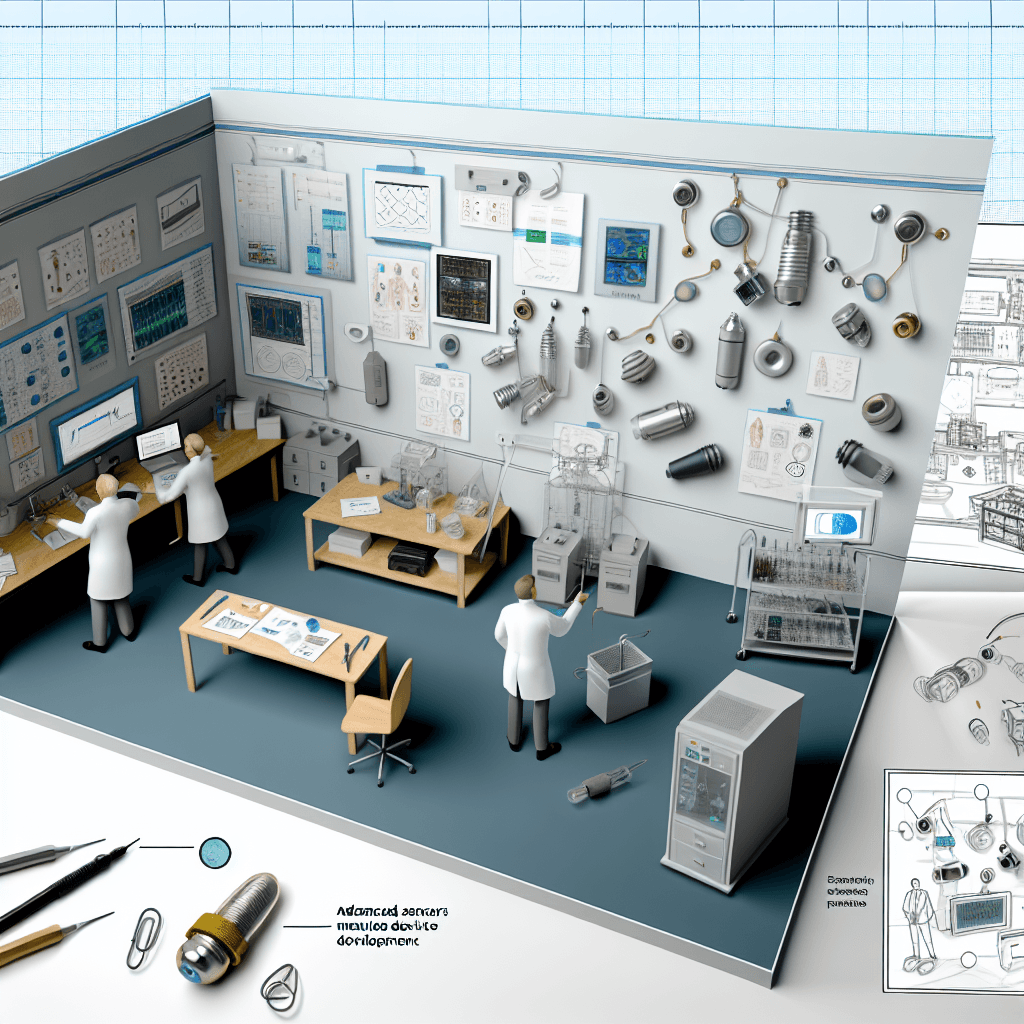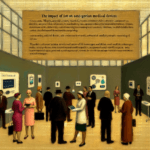Discover how advanced sensors are revolutionizing the medical device industry, improving accuracy and patient outcomes. Learn more here.
How Advanced Sensors Are Shaping Medical Device Development

Table of Contents
- Introduction
- The Role of Advanced Sensors in Improving Patient Outcomes
- Innovative Applications of Advanced Sensors in Medical Devices
- Challenges and Opportunities in Integrating Advanced Sensors into Medical Device Development
- Future Trends in Medical Device Development: The Impact of Advanced Sensors
- Q&A
- Conclusion
“Revolutionizing healthcare through precision and innovation with advanced sensors.”
Introduction
Advanced sensors are revolutionizing the field of medical device development. These highly sophisticated devices are equipped with cutting-edge sensor technology that allows for precise and accurate monitoring of various health parameters. From wearable devices to implantable sensors, these advancements are transforming the way medical conditions are diagnosed, treated, and managed. In this rapidly evolving landscape, the integration of advanced sensors is paving the way for more personalized and efficient healthcare solutions. In this article, we will explore how advanced sensors are shaping the future of medical device development and the potential impact on patient care.
The Role of Advanced Sensors in Improving Patient Outcomes
The field of medical device development has seen significant advancements in recent years, thanks to the integration of advanced sensors. These sensors have revolutionized the way medical devices are designed, manufactured, and used, ultimately leading to improved patient outcomes. In this article, we will explore the role of advanced sensors in shaping medical device development and how they are contributing to better patient care.
One of the primary benefits of advanced sensors in medical devices is their ability to collect and transmit real-time data. This data can provide valuable insights into a patient’s health status, allowing healthcare professionals to make informed decisions about their treatment. For example, sensors in pacemakers can monitor a patient’s heart rate and rhythm, providing crucial information to doctors about the device’s effectiveness and the patient’s overall cardiac health.
Moreover, advanced sensors have enabled the development of smart medical devices that can adapt to a patient’s specific needs. These devices can adjust their settings based on the data collected by sensors, ensuring optimal performance and personalized treatment. For instance, insulin pumps equipped with sensors can monitor a diabetic patient’s blood sugar levels and deliver insulin accordingly, reducing the risk of hypoglycemia or hyperglycemia.
Another significant advantage of advanced sensors in medical devices is their ability to detect potential issues before they become critical. For instance, sensors in implantable devices can detect early signs of infection or malfunction, allowing for timely intervention and preventing serious complications. This early detection can also save patients from undergoing unnecessary surgeries or procedures, reducing healthcare costs and improving their overall quality of life.
Furthermore, advanced sensors have made medical devices more user-friendly and accessible. With the integration of sensors, devices can now provide real-time feedback and instructions to patients, making it easier for them to use and manage their devices. This is particularly beneficial for patients with chronic conditions who need to monitor their health regularly. For example, sensors in glucose monitors can provide patients with real-time readings and alerts, helping them manage their diabetes more effectively.
The use of advanced sensors has also led to the development of remote patient monitoring systems, which have become increasingly popular in recent years. These systems use sensors to collect data from patients in their homes and transmit it to healthcare providers, allowing for continuous monitoring and timely intervention. This has been particularly useful during the COVID-19 pandemic, where remote monitoring has helped reduce the risk of exposure for both patients and healthcare workers.
Moreover, advanced sensors have played a crucial role in the development of minimally invasive medical devices. These devices use sensors to guide surgeons during procedures, reducing the risk of complications and improving patient outcomes. For example, laparoscopic surgery, which uses small incisions and a camera-equipped device, has become a preferred method for many surgeries, thanks to the integration of advanced sensors.
In conclusion, advanced sensors have significantly impacted the field of medical device development, leading to improved patient outcomes and better healthcare delivery. These sensors have enabled the collection of real-time data, personalized treatment, early detection of issues, and the development of user-friendly and accessible devices. As technology continues to advance, we can expect to see even more innovative uses of sensors in medical devices, further improving patient care and revolutionizing the healthcare industry.
Innovative Applications of Advanced Sensors in Medical Devices

In recent years, the medical device industry has seen a significant shift towards the use of advanced sensors in the development of new products. These sensors, which are capable of collecting and analyzing data in real-time, have revolutionized the way medical devices are designed and used. From improving patient outcomes to streamlining healthcare processes, the innovative applications of advanced sensors in medical devices have the potential to transform the healthcare industry.
One of the most significant benefits of advanced sensors in medical devices is their ability to provide real-time data. This means that healthcare professionals can monitor patients’ vital signs and other important metrics continuously, rather than relying on periodic check-ins. This real-time data allows for early detection of any changes in a patient’s condition, enabling prompt intervention and potentially preventing serious complications.
Moreover, advanced sensors have also enabled the development of wearable medical devices. These devices can be worn by patients, allowing for continuous monitoring of their health status. This is particularly beneficial for patients with chronic conditions, as it provides healthcare professionals with a more comprehensive understanding of their condition and allows for personalized treatment plans.
Another innovative application of advanced sensors in medical devices is in the field of telemedicine. With the use of sensors, patients can now receive medical care remotely, without having to physically visit a healthcare facility. This is especially beneficial for patients in rural or remote areas, as it provides them with access to specialized care that may not be available in their local area. Additionally, telemedicine reduces the burden on healthcare facilities, allowing them to focus on more critical cases.
The use of advanced sensors has also led to the development of smart medical devices. These devices are equipped with sensors that can collect and analyze data, and then adjust their settings or provide feedback accordingly. For example, insulin pumps for diabetic patients can now monitor blood sugar levels and automatically adjust the insulin dosage, eliminating the need for manual adjustments. This not only improves patient convenience but also reduces the risk of human error.
Furthermore, advanced sensors have also played a crucial role in the development of minimally invasive medical procedures. With the use of sensors, surgeons can now perform procedures with greater precision and accuracy, reducing the risk of complications. For instance, laparoscopic surgeries, which involve small incisions and the use of a camera and specialized instruments, rely heavily on sensors for visualization and navigation.
In addition to improving patient outcomes, advanced sensors have also had a significant impact on healthcare processes. With the use of sensors, medical devices can now collect and transmit data to electronic health records, eliminating the need for manual data entry. This not only saves time but also reduces the risk of errors. Moreover, the data collected by sensors can be used for data analytics, providing valuable insights for healthcare professionals to make informed decisions.
However, with the increasing use of advanced sensors in medical devices, there are also concerns about data privacy and security. As these devices collect sensitive patient information, it is crucial to ensure that proper measures are in place to protect this data from unauthorized access. Manufacturers must prioritize data security in the design and development of these devices to maintain patient trust and confidence.
In conclusion, the innovative applications of advanced sensors in medical devices have transformed the healthcare industry. From improving patient outcomes to streamlining healthcare processes, these sensors have revolutionized the way medical devices are designed and used. As technology continues to advance, we can expect to see even more groundbreaking applications of advanced sensors in the field of medicine.
Challenges and Opportunities in Integrating Advanced Sensors into Medical Device Development
The use of advanced sensors in medical devices has revolutionized the healthcare industry, providing more accurate and real-time data for diagnosis and treatment. These sensors have the ability to collect and transmit data, allowing for continuous monitoring and personalized care for patients. However, integrating advanced sensors into medical device development also presents its own set of challenges and opportunities.
One of the main challenges in incorporating advanced sensors into medical devices is the complexity of the technology. These sensors are highly sophisticated and require specialized knowledge and expertise to develop and integrate into medical devices. This can be a barrier for smaller companies or startups with limited resources and access to such expertise. Additionally, the cost of developing and implementing these sensors can be high, making it difficult for some companies to invest in this technology.
Another challenge is the regulatory approval process. Medical devices with advanced sensors must go through rigorous testing and approval by regulatory bodies, such as the Food and Drug Administration (FDA) in the United States. This process can be lengthy and costly, as companies must provide evidence of the safety and effectiveness of their devices. Any issues or delays in the approval process can significantly impact the timeline and budget of a project.
Despite these challenges, there are also many opportunities in integrating advanced sensors into medical device development. One of the main advantages is the potential for improved patient outcomes. With the ability to collect and transmit real-time data, medical devices with advanced sensors can provide healthcare professionals with more accurate and timely information for diagnosis and treatment. This can lead to better and more personalized care for patients, ultimately improving their overall health and well-being.
Moreover, the use of advanced sensors can also lead to cost savings in the long run. By continuously monitoring patients, healthcare professionals can detect any changes or issues early on, preventing costly hospital readmissions or complications. This can also reduce the need for frequent doctor visits and tests, saving both time and money for patients and healthcare systems.
Another opportunity is the potential for innovation and new product development. With the advancements in sensor technology, there is a wide range of possibilities for new and improved medical devices. Companies can explore different applications and combinations of sensors to create innovative products that can address unmet medical needs. This can also open up new markets and revenue streams for companies.
However, in order to fully realize the potential of advanced sensors in medical device development, collaboration and partnerships are crucial. Companies can benefit from working together and sharing knowledge and resources to overcome the challenges and capitalize on the opportunities. This can also lead to faster development and commercialization of new products.
In conclusion, the integration of advanced sensors into medical device development presents both challenges and opportunities. While the complexity of the technology and regulatory approval process can be barriers, the potential for improved patient outcomes, cost savings, and innovation make it a worthwhile investment. Collaboration and partnerships are key in overcoming these challenges and maximizing the opportunities for the development of advanced sensor-based medical devices. As technology continues to advance, we can expect to see even more groundbreaking developments in this field, shaping the future of healthcare.
Future Trends in Medical Device Development: The Impact of Advanced Sensors
The field of medical device development has seen significant advancements in recent years, thanks to the integration of advanced sensors. These sensors have revolutionized the way medical devices are designed, manufactured, and used, leading to improved patient outcomes and better overall healthcare. In this article, we will explore the impact of advanced sensors on medical device development and the future trends that are shaping this industry.
One of the key benefits of advanced sensors in medical devices is their ability to collect and transmit real-time data. This data can provide valuable insights into a patient’s health and help healthcare professionals make more informed decisions. For example, sensors in pacemakers can monitor a patient’s heart rate and rhythm, allowing doctors to adjust the device’s settings remotely. This not only improves patient comfort but also reduces the need for frequent hospital visits.
Moreover, advanced sensors have enabled the development of smart medical devices that can adapt to a patient’s needs. These devices can adjust their settings based on the data collected by sensors, providing personalized treatment for each patient. This is particularly beneficial for patients with chronic conditions, as their needs may change over time. With the help of advanced sensors, medical devices can now provide continuous and customized care, leading to better health outcomes.
Another significant impact of advanced sensors on medical device development is the improvement in accuracy and precision. Sensors can measure and detect even the slightest changes in a patient’s condition, allowing for early detection of potential health issues. This is especially crucial in critical care settings, where timely intervention can be a matter of life and death. With advanced sensors, medical devices can now provide real-time monitoring and alert healthcare professionals of any abnormalities, enabling them to take immediate action.
Furthermore, the integration of advanced sensors has also led to the development of minimally invasive medical devices. These devices use sensors to guide surgeons during procedures, reducing the need for large incisions and minimizing the risk of complications. This has not only improved patient comfort but also reduced recovery time and hospital stays. As a result, patients can now undergo complex procedures with minimal disruption to their daily lives.
The future of medical device development is also heavily reliant on advanced sensors. With the rise of wearable technology, sensors are becoming smaller, more affordable, and more accessible. This has opened up new possibilities for the development of medical devices that can be worn by patients, providing continuous monitoring and data collection. These devices can track a patient’s vital signs, activity levels, and even sleep patterns, providing a comprehensive view of their health. This data can be shared with healthcare professionals, allowing for remote monitoring and early detection of potential health issues.
Moreover, the use of advanced sensors in medical devices has also paved the way for the development of artificial intelligence (AI) and machine learning (ML) algorithms. These technologies can analyze the vast amount of data collected by sensors and provide valuable insights for healthcare professionals. For example, AI-powered devices can detect patterns and trends in a patient’s data, helping doctors make more accurate diagnoses and treatment plans. This not only improves patient outcomes but also reduces the risk of human error.
In conclusion, advanced sensors have had a significant impact on medical device development, and their influence will only continue to grow in the future. These sensors have enabled the development of smart, accurate, and minimally invasive medical devices, leading to improved patient outcomes and better overall healthcare. As technology continues to advance, we can expect to see even more innovative medical devices that will revolutionize the way we approach healthcare.
Q&A
1. What are advanced sensors in the context of medical device development?
Advanced sensors in medical device development refer to the use of sophisticated and highly sensitive sensors that can collect and analyze data from the human body. These sensors are integrated into medical devices to monitor various physiological parameters such as heart rate, blood pressure, oxygen levels, and more.
2. How are advanced sensors improving medical devices?
Advanced sensors are improving medical devices in several ways. They provide real-time and accurate data, allowing for better diagnosis and treatment of medical conditions. They also enable remote monitoring, reducing the need for frequent hospital visits. Additionally, advanced sensors can improve the overall functionality and usability of medical devices, making them more user-friendly for both patients and healthcare professionals.
3. What are some examples of medical devices that use advanced sensors?
There are many medical devices that use advanced sensors, including wearable devices such as fitness trackers and smartwatches that monitor heart rate and activity levels. Other examples include glucose monitors for diabetes management, blood pressure monitors, and pulse oximeters. Advanced sensors are also used in more complex medical devices such as MRI machines and robotic surgical systems.
4. What are the potential future developments in advanced sensors for medical devices?
The potential future developments in advanced sensors for medical devices are vast. Some possibilities include the use of artificial intelligence and machine learning to analyze sensor data and provide personalized treatment recommendations. There is also ongoing research in developing sensors that can detect and monitor a wider range of health parameters, such as brain activity and hormone levels. Additionally, advancements in nanotechnology may lead to the development of smaller and more precise sensors for medical devices.
Conclusion
In conclusion, advanced sensors are playing a crucial role in shaping the development of medical devices. These sensors are able to collect and analyze vast amounts of data, providing valuable insights for healthcare professionals and improving patient outcomes. With the continuous advancements in sensor technology, medical devices are becoming more accurate, efficient, and personalized, leading to better diagnosis, treatment, and monitoring of various medical conditions. Additionally, the integration of sensors in medical devices has also opened up new possibilities for remote patient monitoring and telemedicine, making healthcare more accessible and convenient. As the demand for innovative and effective medical devices continues to grow, the role of advanced sensors in shaping their development will only become more significant.








